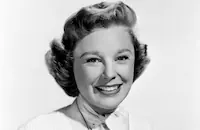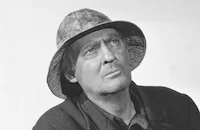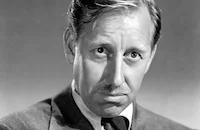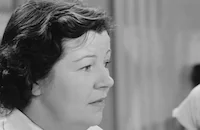Right Cross

Brief Synopsis
Cast & Crew
John Sturges
June Allyson
Dick Powell
Ricardo Montalban
Lionel Barrymore
Teresa Celli
Film Details
Technical Specs

Synopsis
Sean O'Malley, a wheelchair-bound fight promoter who was once known as the best in his business, has lost his professional stature and is now suffering from poor health. Sean's daughter Pat has taken over many of her father's responsibilities, and is romantically involved with Sean's best fighter, Johnny Monterez. Though Sean had hoped that Johnny would help to revive his flagging career, he dislikes the fact that Johnny is ashamed of his Mexican heritage. When Sean tells Pat that promoter Allan Goff is trying to steal Johnny from him, Pat decides to visit Johnny at his training camp. Pat arrives in time to watch Johnny fight a practice match, but the match ends abruptly when fighter Marty Lynn injures Johnny's hand. While Johnny's hand is being examined at the hospital, Pat looks for her friend, Rick Gavery, a hard-drinking sports reporter who has been following Johnny's career. Pat eventually finds Rick in jail, where she has found him on many previous occasions. When Johnny's physician, Dr. George Esmond, tells him that his hand is now vulnerable to permanent injury, Johnny asks the doctor to keep his condition a secret. After telling Pat and some reporters that his hand is merely bruised, Johnny returns to his training camp. A short time later, Johnny receives word that his trouble-prone cousin, Luis, is in jail again and needs two hundred dollars for bail. The news reminds Johnny that Luis, who is also a Mexican immigrant, has not had the same opportunities that he has had to lift himself out of poverty. Believing that his hand injury may end his boxing career at any moment, Johnny decides to sign a lucrative contract with Goff, who has promised to provide him with a guaranteed income from promotional sales after his retirement. Johnny takes Rick to visit his mother, but soon after they arrive, Johnny tells his sister Marina that she must stop dating her boyfriend, Bob, because he is a "gringo." Johnny also tells Marina that Bob is interested in her only because she is the sister of a famous fighter. When Rick accuses Johnny of harboring a prejudice against whites, Johnny sends him away with an insult. Later, Pat, expecting a marriage proposal from Johnny, is disappointed when Johnny tells her that he has decided to sign with Goff. Sean dies a short time later, and Pat accuses Johnny of killing her father with his act of betrayal. Realizing that he has nearly lost Pat's love and Rick's friendship as a result of his actions, Johnny decides to get out of boxing forever by purposely losing the upcoming title match against Al Heldon. Though he loses the match, Johnny does not cause permanent injury to his hand until he punches Rick for being honest with him. With help from Rick, Pat and Johnny reconcile and look forward to a happy future together.

Director

John Sturges
Cast

June Allyson

Dick Powell

Ricardo Montalban

Lionel Barrymore
Teresa Celli
Barry Kelley

Tom Powers
Mimi Aguglia
Marianne Stewart

John Gallaudet
Wally Maher

Larry Keating

Ken Tobey
Bert Davidson
David Fresco
Eddie Simms
Smoki Whitfield
John Maxwell
Harry Shannon

Frank Ferguson
Courtland Shepard
David Wolfe

King Donovan
John Mitchum
George Sherwood
Joe La Cava
Lynton Brent
John Crawford
Sig Froelich
Tom Garland
Dewey Robinson
Jim Hayward
Jack Daley
June Whitley
Harry Stanton
Robert Stephenson
Harry Cody
Jack Barnett
Mack Chandler
William Cabanne
James O'gatty
Teddy Pavelec
James Holbrook

Margaret Bert

John Hamilton
Jim Pierce
Bert Moorhouse
Robert Board
Juan Duval
Ed Dearing
Al Hill
Russ Clark
Tom Hanlon
Bob E. Perry

Marilyn Monroe
Crew
John Banse
Norbert Brodine
Bartley Costello
Jack Dawn
Armand Deutsch
Phil Emery
Curtis Fetters
Cedric Gibbons
Sydney Guilaroff
Kiva Hoffman
John Indrisano
Robert B. Lee
Ethel Neejus
James E. Newcom
Robert Quirk
David Raksin
Silvano R. Ramos
Helen Rose
Charles Schnee
Gabriel Scognamillo
Douglas Shearer
Al Shenberg
Alfred E. Spencer
Edwin B. Willis
Bob Worl
Dolph Zimmer

Photo Collections
Videos
Movie Clip



Film Details
Technical Specs

Articles
Right Cross
Right Cross went a few extra rounds, adding an interracial element to spice romantic tension between hard-boiled promoter Dick Powell, June Allyson and brooding Mexican contender Ricardo Montalban. The on and off-screen chemistry of real life husband and wife team Powell and Allyson fueled the advance publicity when aspects of the conveniently leaked storyline nationally reported that within the course of the narrative Allyson ended up with Montalban.
Aided by Sturges' tight direction, gritty B&W camerawork by Norbert Brodine (The House on 92nd Street (1945), Kiss of Death, 1947) and a moody score by David Raksin (Laura (1944), The Bad and the Beautiful, 1952), Right Cross, by defying convention, pulls no punches. By the way, Dick Powell fans should note that his character finds some solace in his loneliness by pursuing an array of lovely women, most prominently an unbilled Marilyn Monroe, who has less than twenty words of dialogue. In her autobiography, June Allyson, the actress recalled her final days with Powell when they discussed making Right Cross: "We reminisced about Marilyn Monroe and how we'd been floored, both of us, the day that Marilyn, then a young starlet, an unknown, had arrived, wiggling, on the Right Cross set, and how neither of us had predicted she'd be a star."
Director: John Sturges
Producer: Armand Deutsch
Screenplay: Charles Schnee
Cinematography: Norbert Brodine
Art Direction: Cedric Gibbons, Gabriel Scognamillo
Music: David Raksin
Cast: June Allyson (Pat O'Malley), Dick Powell (Rick Garvey), Ricardo Montalban (Johnny Monterez), Lionel Barrymore (Sean O'Malley), Barry Kelley (Allan Goff), Teresa Celli (Marina Monterez).
BW-90m.
by Mel Neuhaus

Right Cross
Kenneth Tobey (1917-2003)
Born in Oakland, California on March 23, 1917, Tobey originally intended to be a lawyer before a stint with the University of California Little Theater changed his mind. From there, he went straight to New York and spent nearly two years studying acting at the Neighborhood Playhouse, where his classmates included Gregory Peck, Eli Wallach and Tony Randall. Throughout the '40s, Tobey acted on Broadway and in stock before relocating to Hollywood. Once there, Tobey soon found himself playing a tough soldier in films like I Was a Male War Bride and Twelve O' Clock High (both 1949); or a tough police officer in Kiss Tomorrow Goodbye and Three Secrets (both 1950). Such roles were hardly surprising, given Tobey's craggy features, unsmiling countenance and rough voice.
Needless to say, no-nonsense, authority figures would be Tobey's calling for the remainder of his career; yet given the right role, he had the talent to make it memorable: the smart, likeable Captain Hendrey in The Thing From Another World (1951); the gallant Colonel Jack Evans in the "prehistoric dinosaur attacks an urban center" genre chiller The Beast from 20,000 Fathoms (1953, a must-see film for fans of special effects wizard, Ray Harryhausen; and as Bat Masterson, holding his own against Kirk Douglas and Burt Lancaster in Gunfight at the O.K. Corral (1957).
Television would also offer Tobey much work: he had his own action series as chopper pilot Chuck Martin in Whirlybirds (1957-59); and had a recurring role as Assistant District Attorney Alvin in Perry Mason (1957-66). He would also be kept busy with guest appearances in countless westerns (Gunsmoke, Bonanza, The Virginian) and cop shows (The Rockford Files, Barnaby Jones, Ironside) for the next two decades. Most amusingly, the tail end of Tobey's career saw some self-deprecating cameo spots in such contemporary shockers as The Howling (1981); Strange Invaders (1983) and his role reprisal of Captain Hendry in The Attack of the B-Movie Monsters (2002). Tobey is survived by a daughter, two stepchildren, and two grandchildren.
by Michael T. Toole
Kenneth Tobey (1917-2003)
Quotes
Trivia
Notes
A March 1949 Hollywood Reporter news item indicates that actress Gloria De Haven was originally cast in the role played by June Allyson. A November 1949 Daily Variety news item adds that Ava Gardner was to play the feminine lead. Although a February 1950 Daily Variety news item lists Polly Bailey in the cast, her participation in the released film has not been confirmed. Marilyn Monroe appears in the film briefly as a model named "Dusky La Dieu."

Miscellaneous Notes
Released in United States Fall October 6, 1950
Released in United States Fall October 6, 1950













